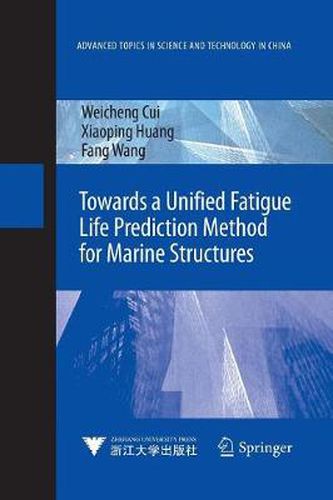Readings Newsletter
Become a Readings Member to make your shopping experience even easier.
Sign in or sign up for free!
You’re not far away from qualifying for FREE standard shipping within Australia
You’ve qualified for FREE standard shipping within Australia
The cart is loading…






This title is printed to order. This book may have been self-published. If so, we cannot guarantee the quality of the content. In the main most books will have gone through the editing process however some may not. We therefore suggest that you be aware of this before ordering this book. If in doubt check either the author or publisher’s details as we are unable to accept any returns unless they are faulty. Please contact us if you have any questions.
In order to apply the damage tolerance design philosophy to design marine structures, accurate prediction of fatigue crack growth under service conditions is required. Now, more and more people have realized that only a fatigue life prediction method based on fatigue crack propagation (FCP) theory has the potential to explain various fatigue phenomena observed. In this book, the issues leading towards the development of a unified fatigue life prediction (UFLP) method based on FCP theory are addressed. Based on the philosophy of the UFLP method, the current inconsistency between fatigue design and inspection of marine structures could be resolved.
This book presents the state-of-the-art and recent advances, including those by the authors, in fatigue studies. It is designed to lead the future directions and to provide a useful tool in many practical applications. It is intended to address to engineers, naval architects, research staff, professionals and graduates engaged in fatigue prevention design and survey of marine structures, in fatigue studies of materials and structures, in experimental laboratory research, in planning the repair and maintenance of existing structures, and in rule development. The book is also an effective educational aid in naval architecture, marine, civil and mechanical engineering.
Prof. Weicheng Cui is the Dean of Hadal Science and Technology Research Center of Shanghai Ocean University, China. Dr. Xiaoping Huang is an associate professor of School of Naval Architecture, Ocean and Civil Engineering of Shanghai Jiao Tong University, China. Dr. Fang Wang is an associate professor of Hadal Science and Technology Research Center of Shanghai Ocean University, China.
$9.00 standard shipping within Australia
FREE standard shipping within Australia for orders over $100.00
Express & International shipping calculated at checkout
This title is printed to order. This book may have been self-published. If so, we cannot guarantee the quality of the content. In the main most books will have gone through the editing process however some may not. We therefore suggest that you be aware of this before ordering this book. If in doubt check either the author or publisher’s details as we are unable to accept any returns unless they are faulty. Please contact us if you have any questions.
In order to apply the damage tolerance design philosophy to design marine structures, accurate prediction of fatigue crack growth under service conditions is required. Now, more and more people have realized that only a fatigue life prediction method based on fatigue crack propagation (FCP) theory has the potential to explain various fatigue phenomena observed. In this book, the issues leading towards the development of a unified fatigue life prediction (UFLP) method based on FCP theory are addressed. Based on the philosophy of the UFLP method, the current inconsistency between fatigue design and inspection of marine structures could be resolved.
This book presents the state-of-the-art and recent advances, including those by the authors, in fatigue studies. It is designed to lead the future directions and to provide a useful tool in many practical applications. It is intended to address to engineers, naval architects, research staff, professionals and graduates engaged in fatigue prevention design and survey of marine structures, in fatigue studies of materials and structures, in experimental laboratory research, in planning the repair and maintenance of existing structures, and in rule development. The book is also an effective educational aid in naval architecture, marine, civil and mechanical engineering.
Prof. Weicheng Cui is the Dean of Hadal Science and Technology Research Center of Shanghai Ocean University, China. Dr. Xiaoping Huang is an associate professor of School of Naval Architecture, Ocean and Civil Engineering of Shanghai Jiao Tong University, China. Dr. Fang Wang is an associate professor of Hadal Science and Technology Research Center of Shanghai Ocean University, China.